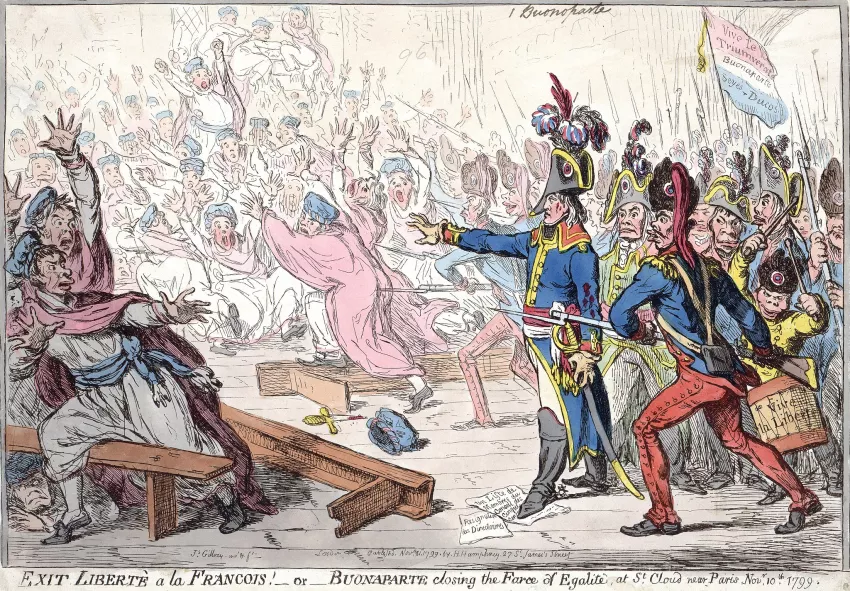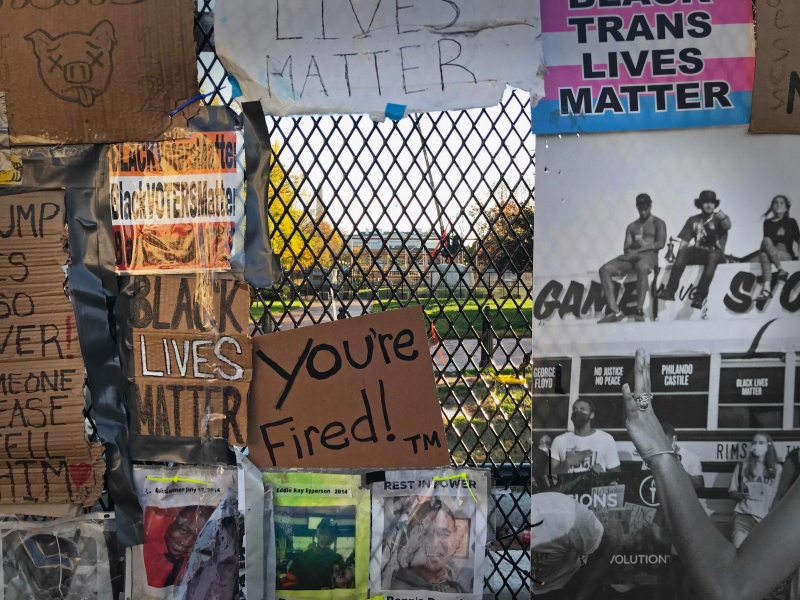James Gillray, Exit Libertè a la Francois!-or- Buonaparte closing the Farce of Egalitè, at St cloud near Paris Novr 10th 1799, 1799. Digital reproduction courtesy of The Trustees of the British Museum, London.
It is now evident that January 6, 2021 was a failed coup d’état, a coup advertised well advance and executed with the same casual, weaponized ineptitude that characterizes all Trumpian endeavours. This has a particular Romantic resonance because the famous coup of 18-19 Brumaire (November 9-10, 1799), in which Napoleon and his allies forcibly dissolved the Directory and installed a new consular government headed by First Consul Bonaparte, was not without its miscues. Unsurprisingly, the aesthetic categories most famously associated with a coup d’état—tragedy and farce, as Marx so powerfully proposed for this event and for Louis Napoleon’s seizure of power in 1851—have been invoked frequently to characterize the assault on the Capitol. Marx’s The Eighteenth Brumaire of Louis Bonaparte makes for bracing reading in the wake of America’s coup in part because one feels elements of historical repetition and in part because what happened feels so unprecedented. We are confronted with the paradox of unprecedented repetition—a form of retroaction that both evokes and negates precedent in order to generate a fantasy of autonomous antecedence—a future condition that saturates time itself. This temporal sleight of hand is in plain sight, for the imperative “Make America Great Again” makes precisely such a claim on the future by collapsing all temporal categories into the now meaningless word “again.”
Because theatre unfolds in the present and yet mediates between past repertoires and unknown futures, it partakes of the temporal uncertainty of the political. Burke famously derogated the French Revolution as a tragi-comedy, and it was precisely generic hybridity that contravened Burke’s dramatic theory of politics. But Burke’s invocation of the normative force of tragedy was always already farcical because Georgian theatrical culture was radically expanding its strategies for eliciting affective response across a host of proliferating new genres. James Gillray’s appraisal of Napoleon’s coup exhibits a less belated sense of generic expectation. In Exit Libertè a la Francoise!—or—Buonaparte closing the Farce of Egalitè, at St. Cloud near Paris Novr 10 1799, Napoleon strides across the picture plane every bit the tragic hero having suffered the dagger wounds drawn against him in the Five Hundred, a fable shored up by Lucien Bonaparte’s suggestion that armed brigands operating at the behest of the English government were afoot (the relationship between misinformation and the coup d’etat seems very prescient). Unlike Marx, who uses the notion of historical devolution from tragedy to farce to imagine a certain death drive within the capitalist state, Gillray sets tragedy and farce at cross purposes here in a dialectical image that invokes and undercuts both genres simultaneously. The print’s caption figures the French state as a farcical imitation of equality, but its pictorial rhetoric renders the autocrat as the tragic hero, albeit one whose claims to heroism are mocked by the hideous demeanour of his armed entourage. As fake tragedy outmaneuvers shitty farce, liberty, that ostensible province of the British constitution, exits the scene altogether. So, Napoleon’s stance is a parody of tragic heroism: “tragedy” purges the nation of one debased entity, but fills the vacuum with a more fearsome assemblage.
Like Marx and Burke, Gillray figures historical events in theatrical terms, but this print entered the mediascape at a moment of intense theatrical and social experimentation. Audiences and publics were repeatedly confronted with unprecedented affective and generic dispositions in the worlds of both entertainment and politics. Volatility, something ostensibly singular, became a recurrent experience that was eventually incorporated and expected within both the theatrical and the political repertoire. At this relatively early moment in the integration of spectacle into both theater and politics, genre’s firm hold on future expectations began to loosen. New forms emerged that largely eschewed normative causality or probability to create a performative scenario in which anything could happen, making one hyper-aware that the present can take any number of predicates. This heightened sense of the uncertainty of historical predication—how the past makes itself felt in the present and takes on a specific future disposition—makes late-Georgian culture of its time and a harbinger of so much to come.
Characterizing the politically polarized mediascape of Romantic performance in this way allows one to discern all too familiar elements of our current social and cultural predicament. Open predication is the hallmark of both reality television and on-line gaming: both media feint at generic control but their affective punctum relies on a hyper-simulation of lived uncertainty. Inculcating the feeling that anything can happen is in many ways the Trumpian brand. Using distraction and obfuscation to disconnect the present from the verifiable past generates the fantasy that all futures are Trump’s future: all temporal differentiation is subsumed into the present of narcissistic identification. For Trump’s supporters, that means all futures are theirs too, not as a collective, but as individual self-generating self-affirming versions of the self-same. That this is the endgame of white supremacy and incel misogyny shouldn’t be surprising, but is this tragedy, as so many pundits have opined? Is this farce?
How do you categorize a performance featuring players who don the skins of animals in costumes carefully designed to show proto-Nazi tattoos; who top the regalia of white supremacy with horned headdresses; who take “direction” from the rants of fascist clowns; who, like strangely confused Romans, fall on their swords by tasering themselves in the testicles; whose patriotism involves laboriously torturing one of the Capitol guards to death (thus proving Johnson’s famous adage); who freely advertise that a similar show can be staged again and again and again because their whiteness ensures that they remain alive? This coup was staged not to usurp power but simply to guarantee that the show will go on: it was an overtly theatrical condensation of all the Trumpian themes because theatre as a medium is so fundamentally tied to the promise of repetition. The events of January 6th took mash-ups already popular on conspiracy websites and demonstrated in realtime the existence of a mass audience ready to relish the repeated smashing of norms to the point of suborning murder. A failed coup but a successful spectacle of one constituency’s claim to a solipsistic future fully detached from the constraints of probability or causality.
Because this parody of a coup deployed a crowd of deluded acolytes rather than an organized junta, it achieved something unprecedented: it became quickly accepted as but one political possibility among many, as the “expression” of a faction, as an accepted “event” that provides a future of self-replication to the Trumpists even while it extinguished the futures of five people and imperilled or permanently altered the lives of myriad others. Those who invaded the Capitol activated a style of historical cosplay that made their present endless, the only possibility for a politics of disruptive narcissism. In this temporal fantasy, every event is unprecedented and yet a repetition not of the history of white supremacy, but rather of the desired future that propels it. In this way, fascism’s future comes to pass without being realized or constrained by any singular historical event. For those who instigated this generic rupture, the affective payoff of this plenitudinous “fake” future is already being monetized to pay down Trump’s legal fees, his looming debts, and support the ongoing obfuscation of what he and his minions have done.
And yet within performative time the present remains a moment when we are other to ourselves, when alterity can be most profoundly recognized. Within the repertoire of American politics, this amplifies awareness of the history of racist and masculinist privilege and challenges any notion that the efficacy of such privilege is timeless. The awareness that these mutually reinforcing forces that have defined American life are ending fuels both the Trumpist delusion and the collective resistance that is opening itself to the radical possibility of liberty grounded in difference. But as Gillray’s print indicates, the now incorporated coup will inhere as a generic possibility that may yet pass into the hands of more ruthlessly effective (or merely opportunistic) players. In that fearsome scenario the stage direction will simply be “Exit Liberty, American style.”


